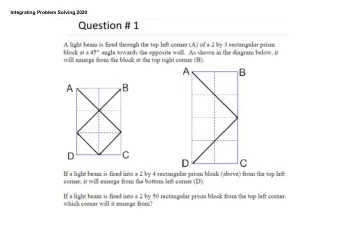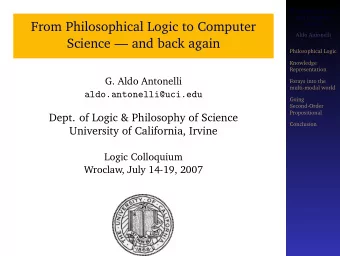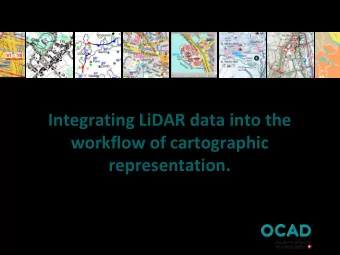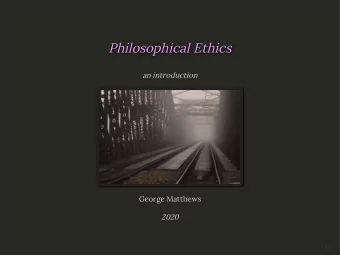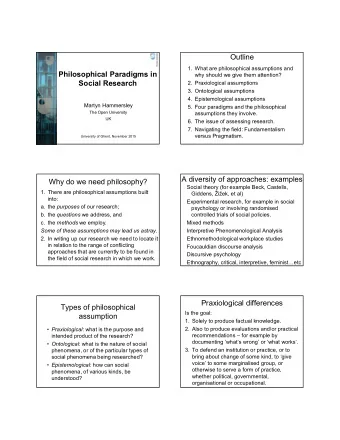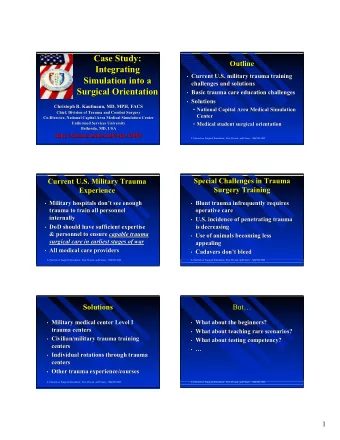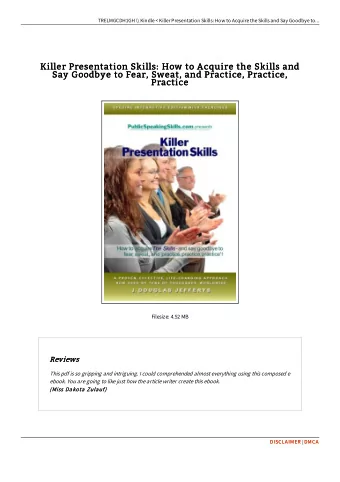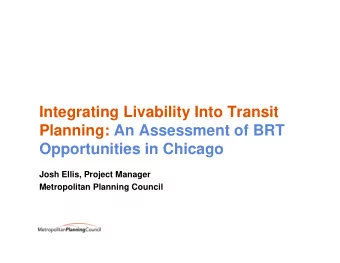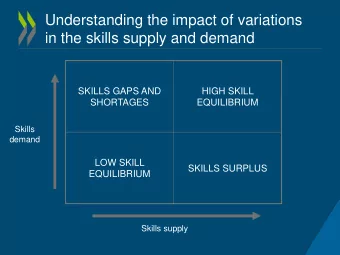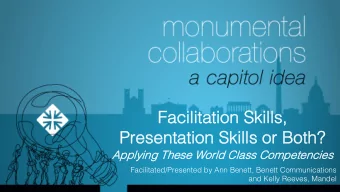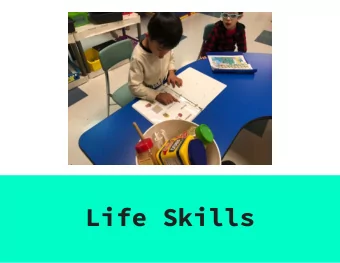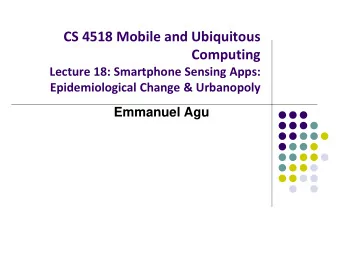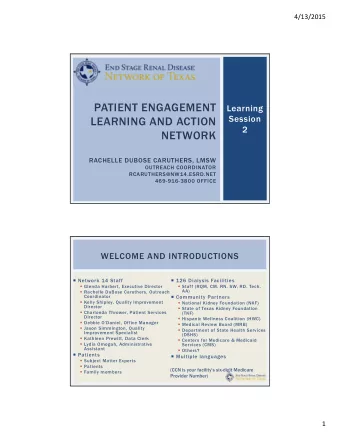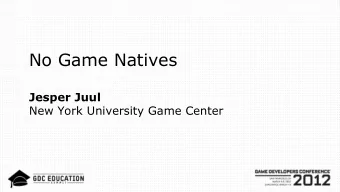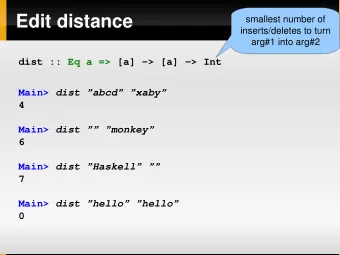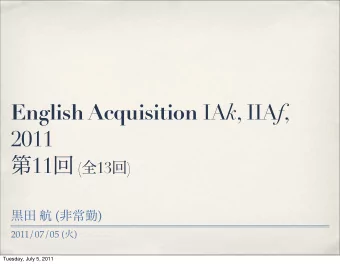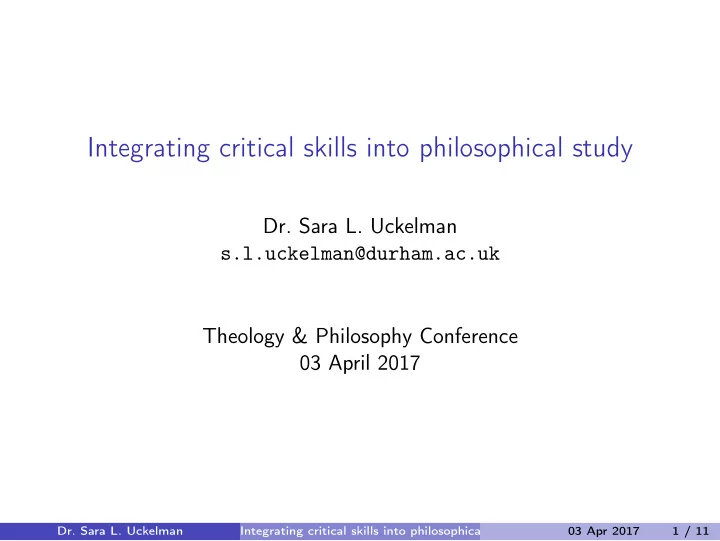
Integrating critical skills into philosophical study Dr. Sara L. - PowerPoint PPT Presentation
Integrating critical skills into philosophical study Dr. Sara L. Uckelman s.l.uckelman@durham.ac.uk Theology & Philosophy Conference 03 April 2017 Dr. Sara L. Uckelman Integrating critical skills into philosophical study 03 Apr 2017 1 /
Integrating critical skills into philosophical study Dr. Sara L. Uckelman s.l.uckelman@durham.ac.uk Theology & Philosophy Conference 03 April 2017 Dr. Sara L. Uckelman Integrating critical skills into philosophical study 03 Apr 2017 1 / 11
What is logic? Logic is the science of correct argumentation. Dr. Sara L. Uckelman Integrating critical skills into philosophical study 03 Apr 2017 2 / 11
What is logic? Logic is the science of correct argumentation. What is an argument? What is a correct argument? Dr. Sara L. Uckelman Integrating critical skills into philosophical study 03 Apr 2017 2 / 11
What is logic? Logic is the science of correct argumentation. What is an argument? ◮ Any ordered collection of one or more declarative statements, the last of which is called the conclusion and the rest of which are called premises. What is a correct argument? Dr. Sara L. Uckelman Integrating critical skills into philosophical study 03 Apr 2017 2 / 11
What is logic? Logic is the science of correct argumentation. What is an argument? ◮ Any ordered collection of one or more declarative statements, the last of which is called the conclusion and the rest of which are called premises. What is a correct argument? ◮ An argument is good if it provides good epistemological grounds for the conclusion. Dr. Sara L. Uckelman Integrating critical skills into philosophical study 03 Apr 2017 2 / 11
What is logic? Logic is the science of correct argumentation. What is an argument? ◮ Any ordered collection of one or more declarative statements, the last of which is called the conclusion and the rest of which are called premises. What is a correct argument? ◮ An argument is good if it provides good epistemological grounds for the conclusion. ◮ An argument is valid if it is impossible for the premises to be true when the conclusion is false. Dr. Sara L. Uckelman Integrating critical skills into philosophical study 03 Apr 2017 2 / 11
Symbolic logic A formal language developed at the end of the 19th century for reasoning about mathematics. Two main types: Propositional and predicate. Language, semantics, proofs. Validity of arguments and entailment of conclusions. Dr. Sara L. Uckelman Integrating critical skills into philosophical study 03 Apr 2017 3 / 11
What do we want people to learn when we teach them symbolic logic? Dr. Sara L. Uckelman Integrating critical skills into philosophical study 03 Apr 2017 4 / 11
What do we want people to learn when we teach them symbolic logic? NOT How to translate from English into symbols. How to determine whether an argument is valid. How to prove conclusions in a formal/symbolic system. How to prove things about formal/symbolic systems. Dr. Sara L. Uckelman Integrating critical skills into philosophical study 03 Apr 2017 4 / 11
What do we want people to learn when we teach them symbolic logic? NOT How to translate from English into symbols. How to determine whether an argument is valid. How to prove conclusions in a formal/symbolic system. How to prove things about formal/symbolic systems. RATHER How to read and apply definitions. How to recognize ambiguity. How to follow rules. Precision, precision, precision. Dr. Sara L. Uckelman Integrating critical skills into philosophical study 03 Apr 2017 4 / 11
Games Clue(do) Logic puzzles Sudoku Dr. Sara L. Uckelman Integrating critical skills into philosophical study 03 Apr 2017 5 / 11
An exercise in precision Dr. Sara L. Uckelman Integrating critical skills into philosophical study 03 Apr 2017 6 / 11
An exercise in precision One rabbit saw six elephants while going to the river. Every elephant saw two monkeys going towards the river. Every monkey holds one parrot in their hands. How many animals are going towards the river? Dr. Sara L. Uckelman Integrating critical skills into philosophical study 03 Apr 2017 6 / 11
The liar paradox Principle of bivalence: Every sentence is true or false. That includes the sentence “This sentence is false” (1). Suppose (1) is true. Then what is says is the case, namely, that (1) is false. So on the assumption that it is true, we are able to prove it is in fact false. Dr. Sara L. Uckelman Integrating critical skills into philosophical study 03 Apr 2017 7 / 11
The liar paradox Principle of bivalence: Every sentence is true or false. That includes the sentence “This sentence is false” (1). Suppose (1) is true. Then what is says is the case, namely, that (1) is false. So on the assumption that it is true, we are able to prove it is in fact false. Not so fast. . . Principle of non-contradiction: No sentence is both true and false. That includes the sentence (1) “This sentence is false”. We proved above that (1) is false. That means that what it says is not the case, namely, that (1) is false. But then, it is true that “This sentence is false”. Dr. Sara L. Uckelman Integrating critical skills into philosophical study 03 Apr 2017 7 / 11
The liar and the truthteller You are standing in front of two doors, one of which leads to certain death and the other of which leads to a life of endless happiness. You do not know which is which. In front of the doors are two guards. One of them always lies, one of them always tells the truth. You do not know which is which. You may ask one guard one question to help you determine which door to open. What question do you ask? Dr. Sara L. Uckelman Integrating critical skills into philosophical study 03 Apr 2017 8 / 11
The liar and the truthteller Answer: Dr. Sara L. Uckelman Integrating critical skills into philosophical study 03 Apr 2017 9 / 11
The liar and the truthteller Answer: “Which door would the other guard says leads to happiness?” Dr. Sara L. Uckelman Integrating critical skills into philosophical study 03 Apr 2017 9 / 11
The liar and the truthteller Answer: “Which door would the other guard says leads to happiness?” If you’ve asked the liar, he will indicate the door leading to death, because the other guard would tell the truth and point to the door leading to happiness. If you’ve asked the truthteller, he will indicate the door leading to death, because the other guard would lie about which leads to happiness, and point to the door leading to death. Dr. Sara L. Uckelman Integrating critical skills into philosophical study 03 Apr 2017 9 / 11
Fallacies https://yourlogicalfallacyis.com/ Dr. Sara L. Uckelman Integrating critical skills into philosophical study 03 Apr 2017 10 / 11
Some Useful Online Logic Resources Logic Puzzles http://logic-puzzles.org/ Logic Textbooks What is Logic? http://community.dur.ac.uk/s.l.uckelman/whatislogic/ The Open Logic Project , http://openlogicproject.org/ forallx: Cambridge , http://people.ds.cam.ac.uk/tecb2/forallx.shtml Logic Videos Introductory Logic, short lectures by Greg Restall, https://vimeo.com/album/2262403 Fallacies “Fallacies”, Internet Encyclopedia of Philosophy , http://www.iep.utm.edu/fallacy/ “Fallacies”, UNC-Chapel Hill Writer Centre, http://writingcenter.unc.edu/handouts/fallacies/ “Thou Shalt Not Commit Logical Fallacies”, https://yourlogicalfallacyis.com/ The Nizkor project, http://www.nizkor.org/features/fallacies/ Dr. Sara L. Uckelman Integrating critical skills into philosophical study 03 Apr 2017 11 / 11
Recommend
More recommend
Explore More Topics
Stay informed with curated content and fresh updates.

